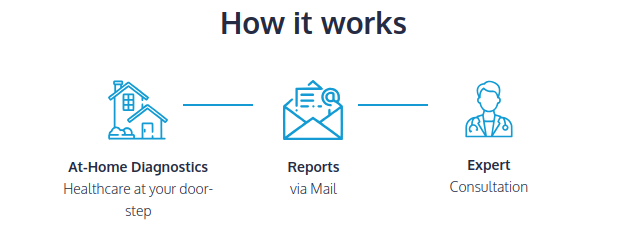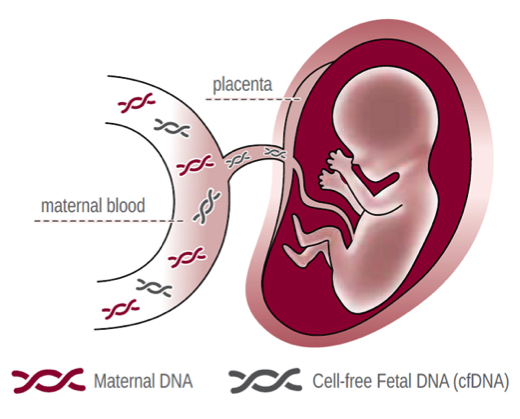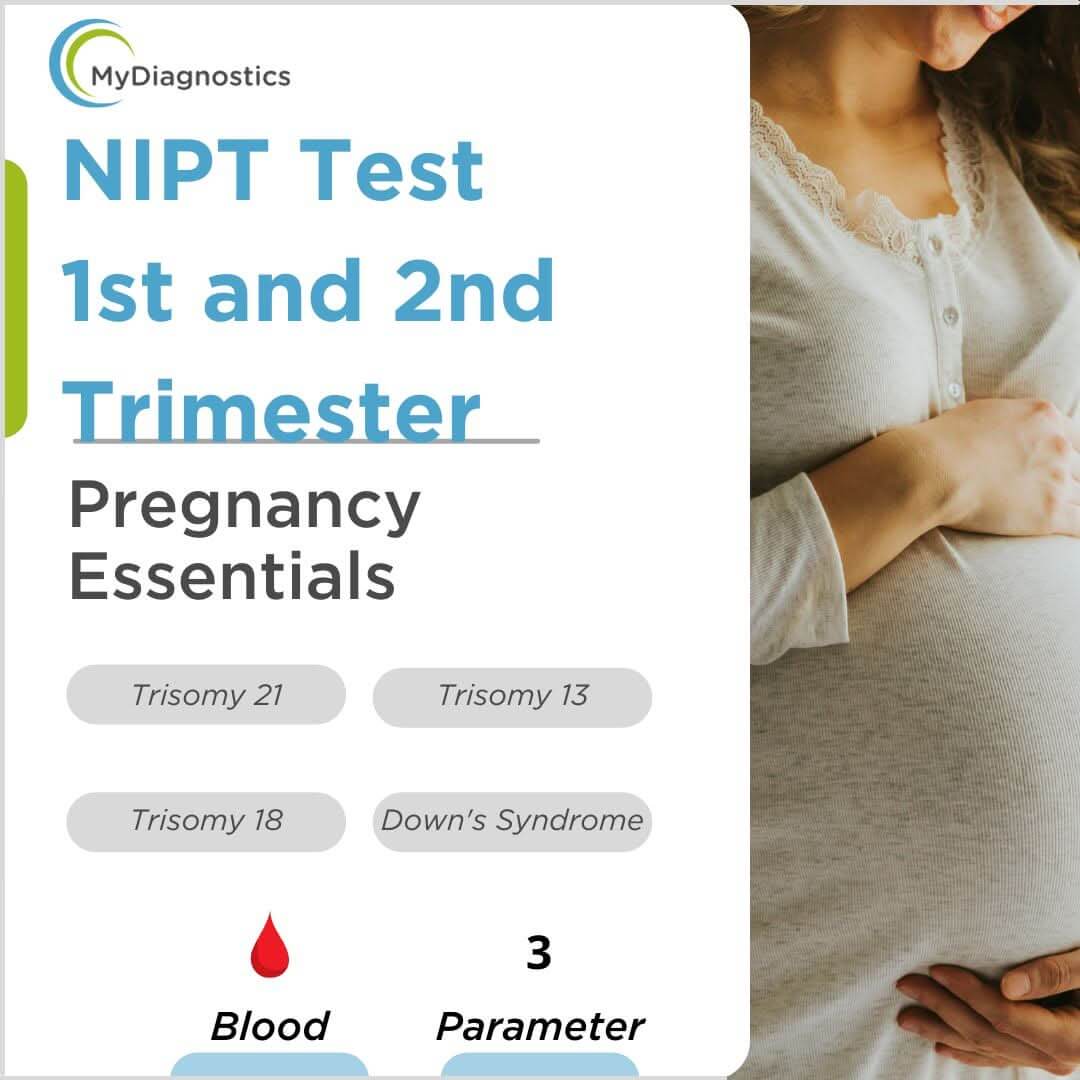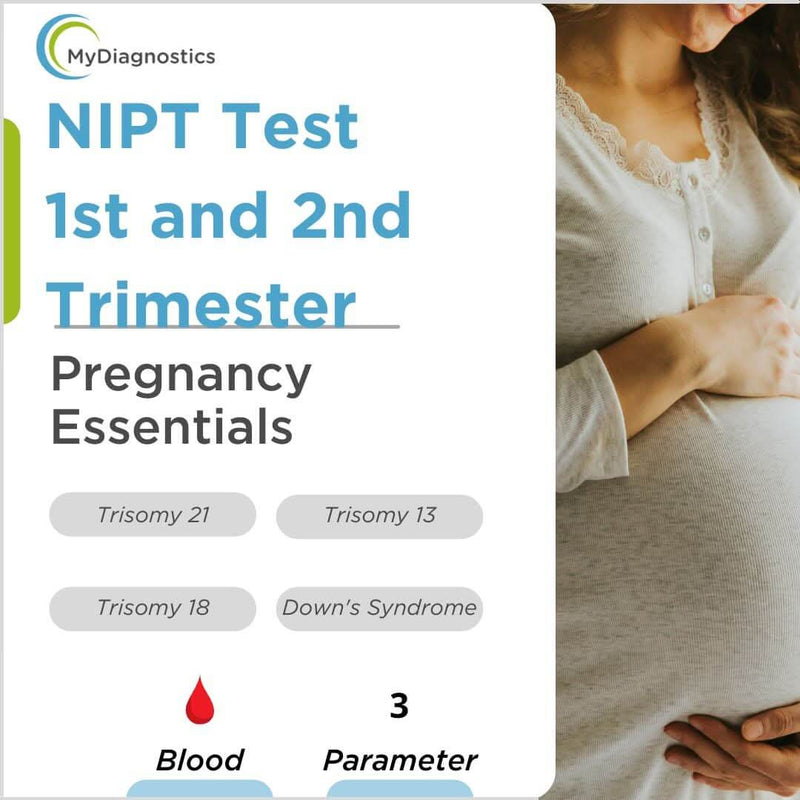NIPT Test in India: Check Price, Accuracy & Book Online
Test Parameters

NIPT test in India, also known as noninvasive prenatal testing, is a screening method that analyzes cell free DNA. Thus, it finds out the risk for certain chromosomal abnormalities, including Down syndrome (trisomy 21), trisomy 18 (Edwards syndrome), or trisomy 13 (Patau syndrome). It is a screening check that can be finished during pregnancy and indicates fetal gender.

NIPT can also be known as noninvasive prenatal screening (NIPS) or cell-free DNA (cfDNA) screening. It is essential to keep in mind that screening assessments can measure the condition of the fetus and provide highly accurate result. Testing through NIPT is elective for expectant parents . Your healthcare expert will provide you with evidence of prenatal genetic testing, as well as offer genetic counseling to discuss your options .
The test procedure involves drawing blood that consists of fetal DNA fragments. This test is beneficial as it allows clinical specialists to offer statistics about fetal chromosomal abnormalities and the fetus's genetic ability by analyzing fetal cfdna . The lab experts will have a look at the blood sample for particular congenital conditions. However, all chromosomal or genetic problems may not be determined via NIPT testing.
What does the NIPT test screen for?
NIPT screening analyzes small DNA fragments that circulate in the mother's blood. This test mainly screens to detect chromosomal abnormalities that include;
Common conditions
- Trisomy 21 (Down syndrome) – an extra copy of chromosome 21
- Trisomy 18 (Edwards syndrome) – an extra copy of chromosome 18
- Trisomy 13 (Patau syndrome) – an extra copy of chromosome 13
Sex chromosome conditions
- Turner syndrome (monosomy X)
- Klinefelter syndrome (XXY)
- Triple X syndrome (XXX)
- Jacobs syndrome (XYY)
Trisomy 18, 13, and Down syndrome all result from an extra chromosome. Sex chromosome screening, can help determine the sex of the fetus. Turner syndrome, Klinefelter syndrome, Triple X syndrome, and XYY syndrome are the most common sex chromosome abnormalities that can be found through NIPT.
NIPT panels do not test for all conditions, so it’s crucial to discuss certain genetic abnormalities and additional chromosomal abnormalities your particular conditions, especially if you have an increased risk, with your healthcare provider.
|
Category |
Condition |
Cause |
Key Notes |
|
Common Trisomies |
Trisomy 21 (Down syndrome) |
Extra copy of chromosome 21 |
Most common condition screened by NIPT; associated with intellectual disability and developmental delay |
|
|
Trisomy 18 (Edwards syndrome) |
Extra copy of chromosome 18 |
Severe condition; often linked with heart defects, shortened lifespan |
|
|
Trisomy 13 (Patau syndrome) |
Extra copy of chromosome 13 |
Rare but serious; associated with multiple congenital abnormalities |
|
Sex Chromosome Conditions |
Turner syndrome (Monosomy X) |
Missing one X chromosome in females (45,X) |
Affects females only; linked with short stature, infertility, heart issues |
|
|
Klinefelter syndrome (XXY) |
Male has an extra X chromosome (47,XXY) |
May cause reduced fertility, learning challenges, taller height |
|
|
Triple X syndrome (XXX) |
Female has an extra X chromosome (47,XXX) |
Often mild or no symptoms; may affect fertility and learning |
|
|
Jacobs syndrome (XYY) |
Male has an extra Y chromosome (47,XYY) |
Usually normal development; may be taller and have mild learning difficulties |
Note: UnderPC-PNDT Act, NIPT is allowed only to detect certain types of abnormalities in the fetus (genetic, chromosomal, congenital, etc.). They cannot be used for sex determination. If NIPT reveals sex (in labs that include that), communicating that is illegal.
What are the Key Characteristics of NIPT
non invasive prenatal test include understanding how it determines low risk and high risk factors .
- There isn't any threat to the expected mother or the unborn child from this non-invasive test.
- In the tenth week of pregnancy, early detection can be achieved.
- This takes a look at the chance of a circumstance instead of a definitive prognosis due to its function as a screening tool instead of an analysis.
Key Benefits of NIPT
- High Accuracy: The NIPT is a device for screening for not unusual chromosomal abnormalities, together with Down syndrome (Trisomy 21), Edwards syndrome (Trisomy 18), and Patau syndrome (Trisomy thirteen). It is incredibly accurate and has a high detection fee.
- Completely Safe: The test requires a blood sample from the mom and does not at once endanger the fetus or increase the danger of miscarriage, in contrast to invasive strategies like amniocentesis or chorionic villus sampling.
- Early Results: Because NIPT can be performed as early as week 10 of pregnancy, it can provide data earlier than other exams and allow for shorter decision-making times.
- Specific Conditions: The NIPT test is beneficial to detect specific conditions of the fetus like Down syndrome, Edward syndrome, Patau syndrome, etc.
Who Should Consider NIPT?
Pregnant women who are 35 years of age or older, have a family history of chromosomal issues, or have had normal outcomes from other prenatal screening tests are especially advised to consider NIPT. Anyone who is at least ten weeks pregnant should consider this test.
The NIPT can provide information about the risk assessment of specific genetic conditions based on the fetal fraction, without the need for invasive testing, but may also indicate the need for further diagnostic testing, allowing the mother and father to make informed decisions about their pregnancy.
Important groups that should consider NIPT:
- Advanced Maternal Age: Because of the higher prevalence of chromosomal abnormalities in pregnant women aged 35 and up, NIPT is an effective screening test.
- Personal or Family History: If a woman has a personal or family history of chromosomal abnormalities or if previous pregnancies have been affected, NIPT may provide more accurate results.
- Abnormal Ultrasound Findings: If an ultrasound reveals signs and symptoms of chromosomal abnormalities, such as excessive nuchal translucency or a lack of nasal bone, NIPT is usually recommended.
- Fertility Treatments: Pregnancies conceived with donor eggs and fertility remedies like IVF, which might also be considered to be at a higher risk, may be eligible for NIPT.
How the NIPT Blood Test Works?
The NIPT blood test procedure undergoes a few steps that include;
Simple Blood Draw: For NIPT, first, the technician draws blood from the tiny DNA fragments of the expectant mother.
Lab Analysis: The expert lab experts carefully analyzes the cell-free fetal DNA (cfDNA) obtained from a simple blood test.
Receive Your Report: After analyzing the technicians, send the report to the dedicated lab. In this report, you will get thorough explanations of the test results. You will also know about low-risk and high-risk conditions. For better understanding, you must consult with your doctor.
Understanding NIPT tests results
While a low-risk result is comforting, it does not ensure that a baby is completely healthy. A high-risk result indicates greater risk and indicates that referral for confirmatory testing (e.g., amniocentesis, chorionic villus sampling (CVS)) is needed for definitive diagnosis if there are abnormal results, while also considering the possibility of false negative results .
The NIPT helps to analyze whether the pregnancy is at "low risk" or "high risk" for common chromosomal conditions, such as Down syndrome, Edwards syndrome, or Patau syndrome.
|
Result Type |
What It Means |
Next Steps |
Key Notes |
|---|---|---|---|
|
Low-Risk Result |
No increased risk detected for the chromosomal conditions tested (e.g., Down, Edwards, Patau syndromes). |
Continue with routine prenatal care. Follow up with regular ultrasounds and doctor visits. |
- Does not guarantee a completely healthy baby.- Some rare genetic conditions may still be missed.- Offers reassurance but is not a diagnosis. |
|
High-Risk Result |
Suggests a higher chance of chromosomal abnormality in the fetus. |
Confirmatory testing recommended (Amniocentesis or CVS). Seek genetic counseling to understand results. |
- Not a 100% diagnosis—false positives are possible.- Helps in early decision-making.- Urgent follow-up testing is important. |
In some cases, repeat testing can be necessary if some results are inconclusive due to insufficient fetal DNA. This can be the case if tests were done too early, for example, in some cases with higher maternal body mass index (BMI).
Low-Risk Result:
It implies that no increased threat for the examined chromosomal issues is observed by using the NIPT. The result is comforting; however, it no longer rules out any genetic or developmental troubles. It no longer assures a healthy baby; however, it does imply a decreased probability, but additional assessments or further testing may still be advisable .
High-Risk Result:
It suggests that the baby is much more likely to have one of the chromosomal issues that had been screened for. It suggests that more diagnosis regarding the fetus's genetic makeup is required to verify the consequences; it isn't an analysis. Your doctor will recommend a diagnostic method, together with amniocentesis or Chorionic Villus Sampling (CVS), to make a definitive prognosis.
Next Steps & Key Considerations
- A genetic counsellor or your healthcare provider can assist you in learning about your options for additional testing and interpreting the results for your specific risk factors.
- During pregnancy, simple diagnostic techniques such as amniocentesis or CVS can provide a definitive prognosis.
- Despite its high accuracy, NIPT has a small risk of producing false positives (high-threat results while the fetus is unaffected) and false negatives (low-risk results while the fetus is affected).
NIPT Test Cost in India 2025
The NIPT test cost in India varies from INR 10,000 to INR 20,000. For better and accurate test procedure, we recommend MyDiagnostics. Here, the NIPT test price is INR 12,500. Here, our experienced healthcare experts provide the best information and suggest you the best under any circumstances.
Comprehensive NIPT panels that cover a much wider range of genetic conditions are higher priced than fundamental screening. Also, high-volume diagnostic labs that employ cutting-edge testing methods may also charge a higher fee. The price also varies according to different places. For an additional price, a few labs provide health practitioner consultations or quicker results.
|
Type of NIPT Test |
What It Covers |
Approx. Cost (INR) |
Notes |
|---|---|---|---|
|
Basic NIPT Panel |
- Common trisomies: 21 (Down syndrome), 18 (Edwards), 13 (Patau) - Fetal sex (not disclosed in India due to PC-PNDT Act) |
₹10,000 – ₹13,000 |
Usually sufficient for most pregnancies; higher accuracy for trisomy 21. |
|
Advanced NIPT Panel |
- All conditions in Basic panel - Sex chromosome abnormalities (Turner, Klinefelter, XXX, XYY) - Some microdeletions/duplications (depends on lab) |
₹14,000 – ₹20,000+ |
More comprehensive; costlier due to wider screening and advanced technology. |
|
Add-On Services |
- Genetic counseling - Faster turnaround (express results) |
₹1,000 – ₹3,000 extra |
Optional, depends on lab offerings. |
The MyDiagnostics Advantage
Non-Invasive Prenatal Testing (NIPT) at MyDiagnostics provides the same benefits as modern NIPT. These consist of the capacity to provide early records faster than the different screening strategies of non invasive prenatal testing, high accuracy in screening for not unusual chromosomal conditions, including Down syndrome, Patau syndrome, etc. Here's how we can help you with;

- Establish Trust and Authority: MyDiagnostics' NIPT carrier objectives to provide expectant parents with early insights while decreasing the need for invasive methods. We provide a non-invasive approach to assessing fetal chance for chromosomal abnormalities.
- Expert Partners: We work with a group of experts. To discover MyDiagnostics partners, you will most likely need to contact the agency or interact directly with the MyDiagnostics platform.
- Quick turnaround: To study the genetic fabric and hit upon any potential chromosomal abnormalities, labs use superior strategies, which include Next-Generation Sequencing (NGS). This gives you accurate outcomes as speedily as possible.
- Convenience: MyDiagnostics presents complete checkout programs for a variety of medical situations, risk factors, fitness markers, and preventative care categories.
- Genetic Counselling: MyDiagnostics focuses on at-home sample series for diagnostic and fashionable fitness checks. Genetic counselling isn't always one of their number one offerings. Nonetheless, they may be capable of assisting you in obtaining genetic testing and connecting you with a genetic counsellor, though they'll no longer provide counselling without delay.
Prenatal screening tests like NIPT can appropriately and non-invasively hit upon chromosomal abnormalities within the fetus. This check gives pregnant ladies peace of mind and can be completed as early as 10 weeks of pregnancy, enabling early diagnosis . So, book your NIPT test today through MyDiagnostics for early, safe, and accurate screening.






